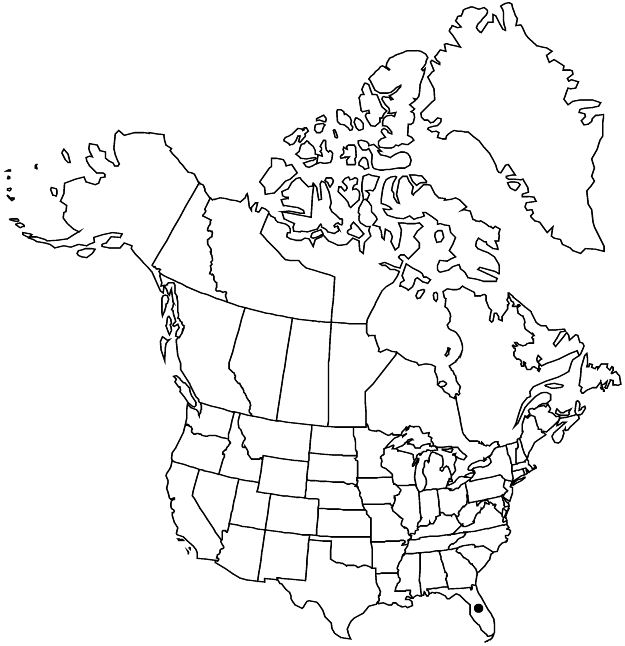Difference between revisions of "Euphorbia trichotoma"
Nov. Gen. Sp. 2(fol.): 48; 2(qto.): 60. 1817.
FNA>Volume Importer |
FNA>Volume Importer |
||
| Line 16: | Line 16: | ||
|name=Galarhoeus trichotomus | |name=Galarhoeus trichotomus | ||
|authority=(Kunth) Small | |authority=(Kunth) Small | ||
| − | }}{{Treatment/ID/Synonym | + | }} {{Treatment/ID/Synonym |
|name=Tithymalus trichotomus | |name=Tithymalus trichotomus | ||
|authority=(Kunth) Klotzsch & Garcke | |authority=(Kunth) Klotzsch & Garcke | ||
| Line 34: | Line 34: | ||
|elevation=0–10 m. | |elevation=0–10 m. | ||
|distribution=Fla.;Mexico;West Indies;Central America. | |distribution=Fla.;Mexico;West Indies;Central America. | ||
| − | |discussion=<p>Euphorbia trichotoma is found in coastal peninsular Florida from Hillsborough County south to Key West.</p> | + | |discussion=<p><i>Euphorbia trichotoma</i> is found in coastal peninsular Florida from Hillsborough County south to Key West.</p> |
|tables= | |tables= | ||
|references= | |references= | ||
| Line 58: | Line 58: | ||
|publication year=1817 | |publication year=1817 | ||
|special status=Conservation concern | |special status=Conservation concern | ||
| − | |source xml=https://jpend@bitbucket.org/aafc-mbb/fna-data-curation.git/src/ | + | |source xml=https://jpend@bitbucket.org/aafc-mbb/fna-data-curation.git/src/8f726806613d60c220dc4493de13607dd3150896/coarse_grained_fna_xml/V12/V12_893.xml |
|genus=Euphorbia | |genus=Euphorbia | ||
|subgenus=Euphorbia subg. Esula | |subgenus=Euphorbia subg. Esula | ||
Revision as of 14:50, 18 September 2019
Herbs, perennial, with thick rootstock. Stems erect, branched, 15–40 cm, glabrous. Leaves: petiole absent; blade obovate to oblanceolate, 5–20 × 2–7 mm, base broadly attenuate, margins entire, apex acute to obtuse, surfaces glabrous; venation pinnate, very obscure, midvein prominent. Cyathial arrangement: terminal pleiochasial branches 3, each usually 1–2 times 3-branched, sometimes unbranched; pleiochasial bracts similar in shape and size to distal leaves, alternate; dichasial bracts distinct, obovate to oblanceolate, base broadly attenuate, margins entire, apex acute to obtuse; axillary cymose branches 0. Cyathia: peduncle 0.7–1 mm. Involucre hemispheric, 1–1.5 × 1.4–2 mm, glabrous; glands 5, elliptic to slightly crescent-shaped, 0.4–0.6 × 0.9–1.1 mm; horns divergent, 0.1–0.2 mm. Staminate flowers 8–10. Pistillate flowers: ovary glabrous; styles 0.2–0.4 mm, 2-fid. Capsules depressed-ovoid, 1.1–1.5 × 2–3 mm, strongly 3-lobed; cocci rounded, minutely papillate, sometimes appearing smooth, glabrous; columella 1.6–1.9 mm. Seeds white, ovoid-globose, 1.8–2 × 1.6–1.8 mm, smooth; caruncle ± rounded and flattened, 0.3 × 0.3 mm.
Phenology: Flowering and fruiting year-round (primarily spring–summer).
Habitat: Coastal beaches, sand dunes, thickets.
Elevation: 0–10 m.
Distribution

Fla., Mexico, West Indies, Central America.
Discussion
Euphorbia trichotoma is found in coastal peninsular Florida from Hillsborough County south to Key West.
Selected References
None.